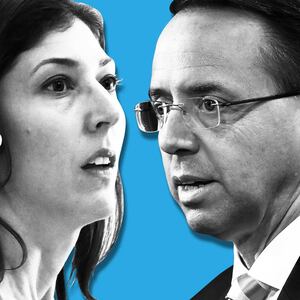With the election just days away, more than the congressional balance of power is at stake. In some ways, the special counsel investigation is on the ballot, too.
Now nearly a year-and-a-half old, Special Counsel Robert Mueller’s investigation into Russian interference in the 2016 election has endured increasing attacks from President Trump and his surrogates. Trump in turn has railed against Attorney General Jeff Sessions for his decision to recuse himself from the Russia investigation, and he has also routinely attacked Deputy Attorney General Rod Rosenstein, who is overseeing the investigation. Notwithstanding his repeated attacks, Trump has left both Sessions and Rosenstein in place. For now.
Trump seems to be waiting until after Election Day before taking any action on Sessions, Rosenstein, or the investigation itself. In recent weeks, there has been widespread speculation that Sessions or Rosenstein (or both) will leave their positions following the election, regardless of whether the Democrats capture the House or Senate. But the results of the election may have a profound impact on Trump’s handling of the Russia investigation.
ADVERTISEMENT
If voters at the polls reject Trump-backed candidates and deliver a Democratic majority to the House of Representatives or the Senate, there will be both practical and political consequences. In the unlikely event that Democrats gain control of the Senate and oversee the confirmation process for a successor to Sessions or Rosenstein, it will be far more difficult for Trump to appoint a “loyalist” in those positions. If the more likely possibility that the Democrats win the majority in the House occurs, it will be perceived as a rebuke to Trump and would potentially provide a backstop to Mueller in the form of congressional investigative power.
On the other hand, if Republicans hold both chambers, Trump undoubtedly will be emboldened. This might allow for a true “loyalist” to be appointed to oversee the investigation, and it would allow Trump allies in Congress to undermine or limit the investigation and its outcomes.
If Republicans maintain control of Congress, Trump may be sufficiently buoyed to order Mueller’s firing (which he can’t do directly, but a pliant ally at DOJ may be willing to do for him). This would be both a legal and political mistake, even with a Republican Congress. From a legal perspective, removing Mueller would at minimum bolster the case for obstruction of justice. It would also certainly lead to litigation, as the special counsel can only be removed for “misconduct, dereliction of duty, incapacity, conflict of interest, or for other good cause” under the regulations authorizing his appointment. If the President were to pursue this course, he would likely rely on the “conflict of interest” provision of the regulations, which he has previously mentioned a number of times, even though the Office of Government Ethics at DOJ has undoubtedly cleared Mueller of any potential conflicts of interest.
Perhaps more salient to the President’s thinking, however, is that the political blowback from such a move would be severe. If the Saturday Night Massacre is any guidepost, recall that Nixon failed to achieve his objective because a new special prosecutor was appointed to take over for the ousted Archibald Cox. In fact, many believe the decision to have Cox fired was truly the beginning of the end for Nixon, as Republicans ultimately ceased to support him and urged him to resign. Past could be mere prologue in this instance.
Yet Trump could still effectively thwart the investigation and avoid significant backlash by stopping just short of firing Mueller. Instead, he could install a new acting attorney general charged with overseeing the investigation either by replacing Sessions or Rosenstein (or both) – a “loyalist” committed to undercutting, rather than shuttering, the investigation.
First, Mueller’s new boss could limit the scope of the investigation, including by refusing to authorize indictments or subpoenas requested by Mueller. One can imagine any number of pretextual reasons for doing this, including any of the baseless talking points that Trump has lofted over the past year, such as asserting that the investigation was improperly initiated and is therefore invalid. A Trump loyalist might reject a proposed indictment of Trump’s children or a proposed subpoena of the President himself. Notably, if a new acting attorney general does decide that a recommended action by the Special Counsel should not be pursued, the special counsel regulations would require Rosenstein’s successor to notify Congress (another reason why control of Congress is so important to the investigation).
Second, a Trump loyalist might espouse the “unitary executive” theory parroted by administration surrogate Rudy Giuliani and other Republican supporters. This legal theory, which has no support in case law, nonetheless argues that Trump simply cannot obstruct justice because he can do whatever he pleases as the head of the executive branch, including firing an FBI director overseeing an investigation into his campaign and associates. If a Trump loyalist were to oversee the investigation, he or she might shut down the obstruction of justice investigation as legally improper based on this broad theory of unchecked executive power.
Third, a new acting attorney general could limit the dissemination of the special counsel’s “confidential report” outlining prosecutorial decisions, as required by the special counsel regulations. It is the Justice Department’s current view that a sitting president cannot be indicted, and the special counsel regulations say Mueller must “comply with the rules, regulations, procedures, practices, and policies of the Department of Justice.” For these reasons, I do not expect Mueller to indict the president, no matter how strong the evidence might be. Instead, Mueller will likely submit a detailed report to the (acting) attorney general that will outline the investigation’s findings about the president.
As we learned yesterday when a district court unsealed the Watergate special prosecutor’s “Road Map” – a document that the Grand Jury provided to Congress outlining evidence it heard relevant to Nixon’s role in the scandal – it is possible for the Special Counsel to relay detailed material from the grand jury to Congress (at the very least). Yet unlike in Watergate where the special prosecutor made the decision to convey the Road Map to Congress, the current regulations governing the special counsel leaves it entirely to the discretion of the attorney general whether to provide a report from Mueller (or the grand jury, as with the Road Map) to Congress or the public. In other words, unlike in Watergate, the attorney general can unilaterally decide whether to release Mueller’s forthcoming report on the president’s conduct, and could use other legal restrictions (such as grand jury secrecy) as a pretext for choosing not to do so.
Although the public pressure to release the report will be immense, a true Trump loyalist may not relent. Even though a court could altogether unseal grand jury material for public dissemination if a request is made (which happened in the anthrax investigation a decade ago), a Rosenstein successor could pursue a more politically palatable middle ground by relying upon grand jury secrecy restrictions to merely allow a selective summary of the report to be released. This would permit a Trump loyalist to control the narrative, and it could take the teeth out of what will likely be a detailed and persuasive report. Given its track record over the past two years, we should expect a Republican-controlled Congress to be complicit in shielding the report from public view, whereas a Democratic-controlled Congress likely would place significant pressure – perhaps even using its subpoena power in its oversight role – to force the Justice Department to release Mueller’s report.
Thus far, efforts to substantially interfere with the investigation have failed. But the results of Tuesday’s election may dictate what course Trump takes and, ultimately, what comes out of the special counsel’s investigation. Indeed, far more than the congressional majority is at stake in this election.
Daniel S. Goldman is a Fellow at the Brennan Center for Justice at NYU School of Law and an NBC News and MSNBC Legal Analyst. From 2007 to 2017, he served as an Assistant U.S. Attorney for the Southern District of New York. Follow him @danielsgoldman.







